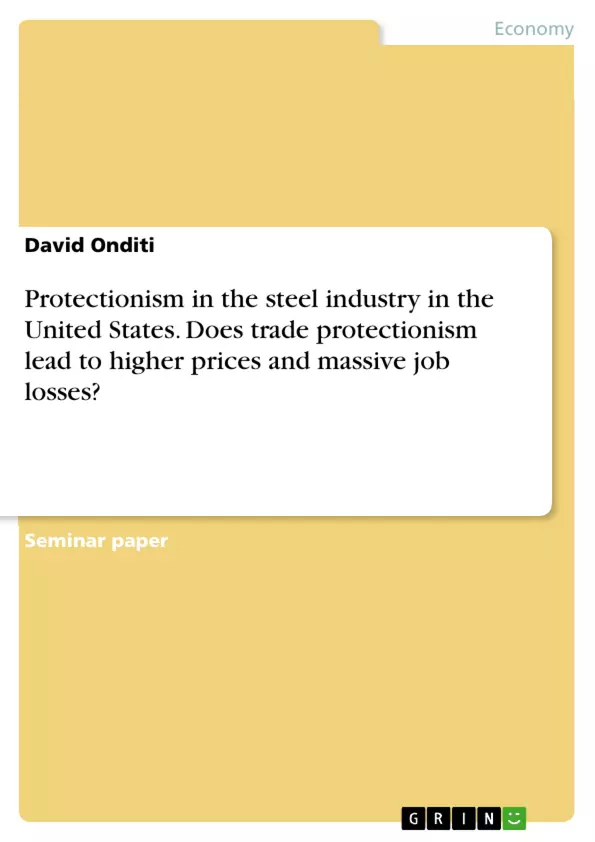The central research question is linked to the implications of protectionism in the steel industry in the US. The hypothesis is that trade protectionism leads to higher prices and massive job losses. The case study design is employed as is allows for the in depth understanding and examination of the steel industry in the US and the implications of the trade policies on the jobs as well as prices. The research applied archival research method applying a mixed methodology.
The findings of the research indicate that the application of protectionism in the steel sector would harm not only the consumers but the industry being protected. It can be concluded that protectionism has negative implications in terms of higher prices and loss of jobs. The project was restricted by the research design as the use of a single case study limits the comparability and thus the generalizability of the results. The research focused only on the steel industry in the US thus restricting the applications of the findings in other sectors or industries in the US or even the steel industries in other countries. The research implies that trade policies in the US should favor the use of market forces dictated by the principles of the WTO rather than focusing on the nationalism of the economies.
The economic nationalism in the United States has risen in the past couple of years, fueled by and fueling the election of President Donald Trump. With the increased call for nationalism of the economies comes the view that protectionism has achieved great success in the history of the United States. However, the calls for greater protectionism ignores the vast amounts of academic analysis and contemporary reporting that indicates that the trade protectionism in the United States has led to immense economic costs on the economy and the American consumers.
Table of Contents
- Introduction
- Literature Review
- The history of the trade policies in the US
- Steel industry and protectionism
- Methodology
- Research design
- Research method(s)
- Case study Justification
- Potential drawbacks
- Discussion
- Protectionism is linked to price increases
- Destruction of the American jobs
- Conclusion
- References
- Appendix
Objectives and Key Themes
This research paper investigates the implications of protectionism in the steel industry in the United States. The study aims to determine whether trade protectionism leads to higher prices and significant job losses. The paper employs a case study design to examine the steel industry and the impact of trade policies on employment and prices. The findings are based on archival research using a mixed methodology.
- The impact of protectionism on the US steel industry
- The relationship between trade protectionism and price increases
- The relationship between trade protectionism and job losses
- The effectiveness of protectionist measures in promoting economic development
- The role of free trade and market forces in economic growth
Chapter Summaries
The Introduction section sets the context for the research by discussing the rise of economic nationalism in the United States and the debate surrounding the effectiveness of protectionist measures. The Literature Review delves into the history of trade policies in the US steel industry, highlighting key events and the evolution of protectionist measures. The Methodology chapter outlines the research design, methods, and justifications for the case study approach, including a discussion of potential drawbacks.
The Discussion section presents the key findings of the study, exploring the link between protectionism and price increases as well as the impact on American jobs. The paper concludes by summarizing the research findings and offering insights into the implications of protectionist policies for the steel industry and the US economy.
Keywords
Protectionism, steel industry, trade policy, economic nationalism, price increases, job losses, US economy, case study, archival research, mixed methodology, free trade, market forces, World Trade Organization (WTO).
- Quote paper
- David Onditi (Author), 2019, Protectionism in the steel industry in the United States. Does trade protectionism lead to higher prices and massive job losses?, Munich, GRIN Verlag, https://www.grin.com/document/471295




